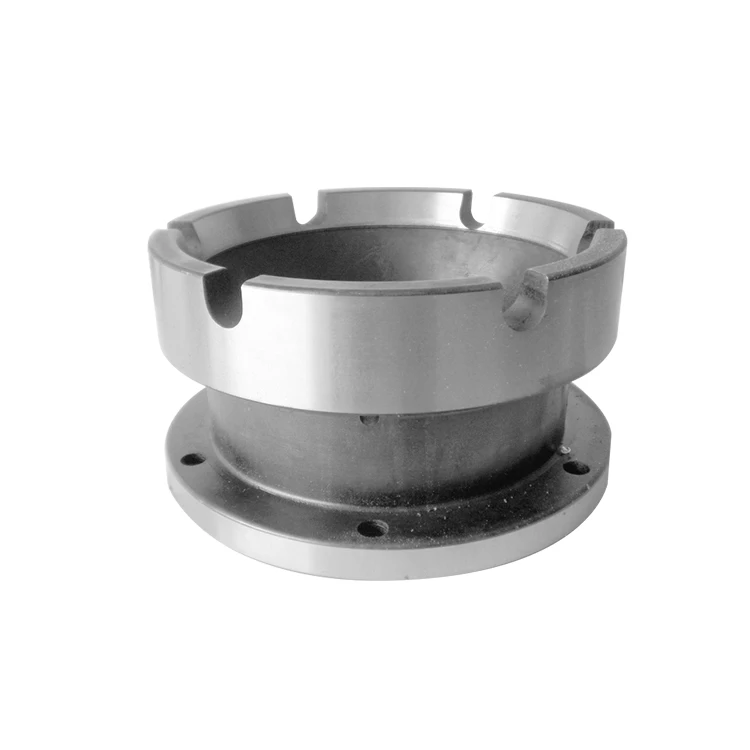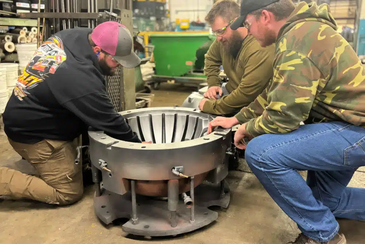Aluminum casting and its role in engineering advancements
Just How Aluminum Foundries Contribute to Numerous Industries: A Detailed Introduction
Aluminum shops act as necessary vendors throughout numerous markets, consisting of auto, aerospace, construction, and electronic devices. They create elements that are not just light-weight however also resilient, enhancing the efficiency of numerous items. With innovative spreading methods and a commitment to sustainability, these shops are adjusting to fulfill progressing market demands. As they innovate, the influence of aluminum castings on various applications elevates important questions concerning the future of manufacturing. What exists in advance for this vital market?
The Duty of Light Weight Aluminum Foundries in the Automotive Market
As the auto sector significantly accepts lightweight materials to improve fuel effectiveness and performance, aluminum foundries play a crucial function in this evolution. These facilities specialize in the manufacturing of light weight aluminum castings, which are important parts in modern-day vehicles. By supplying high-strength, lightweight components, light weight aluminum shops allow suppliers to lower the overall weight of lorries, ultimately leading to enhanced gas economic situation and minimized discharges.
Light weight aluminum's resistance to rust better enhances car long life, making it an eye-catching option for car manufacturers. Factories utilize advanced techniques such as die spreading and sand spreading to create specific and intricate elements, making certain that they meet stringent market standards. In addition, the capacity to recycle aluminum effectively contributes to a much more sustainable manufacturing procedure. As the auto industry remains to innovate, light weight aluminum foundries will certainly continue to be pivotal in providing the materials essential for the next generation of lorries, sustaining both efficiency and environmental objectives.

Aerospace Applications of Aluminum Castings
Aluminum castings are important to the aerospace sector, providing a combination of lightweight stamina and durability that is essential for aircraft efficiency. These spreadings are utilized in different parts, such as engine parts, structural structures, and touchdown gear, where weight decrease is critical for fuel efficiency and overall safety and security. The convenience of aluminum enables intricate geometries that boost wind resistant efficiency while maintaining architectural stability.
In addition, developments in casting modern technologies have enhanced the accuracy and surface finish of light weight aluminum elements, lowering the requirement for comprehensive post-processing. This performance not just accelerates manufacturing timelines however additionally reduces prices, making aluminum an appealing option for producers. The rust resistance of light weight aluminum assurances durability and dependability in severe operating atmospheres, better establishing its role in aerospace applications. As the sector advances, aluminum spreadings proceed to be an essential product, driving advancement and sustaining the growth of next-generation aircraft.
Construction Industry Technologies With Light Weight Aluminum
The construction sector has progressively taken on aluminum because of its light-weight residential or commercial properties and flexibility, paralleling its effective applications in aerospace. Developments in light weight aluminum design have actually resulted in more powerful, extra effective structures, enabling building contractors and engineers to explore brand-new possibilities. The product's resistance to deterioration and reduced maintenance requires make it particularly appealing for both business and property tasks.
Light weight aluminum's flexibility assists in the creation of elaborate styles, enabling aesthetic improvements that were formerly challenging with traditional products. Prefabrication techniques have actually likewise evolved, making use of light weight aluminum to minimize building time and expenses substantially. Furthermore, the power performance of light weight aluminum systems-- such as home window frameworks and roofing-- adds to lasting structure techniques, lining up with modern-day environmental requirements. As the building industry remains to accept these improvements, light weight aluminum's role is anticipated to broaden, driving further technology and adding to the growth of resilient infrastructures.
Electronic devices and the Demand for Lightweight Aluminum Components
With the rapid improvement of innovation, the need for light-weight light weight aluminum components in the electronic devices industry has actually risen. As gadgets end up being a lot more portable and small, manufacturers seek products that use both durability and weight decrease. Light weight aluminum, with its superb strength-to-weight proportion, has emerged as a preferred selection for parts such as housings, heat sinks, and architectural supports.
Using light weight aluminum not only improves item efficiency but additionally adds to power performance, as lighter gadgets need less power throughout operation. Additionally, aluminum's exceptional conductivity makes it perfect for digital applications, making certain reliable warmth dissipation and reducing the danger of getting too hot.
As customer preferences change in the direction of streamlined and lightweight devices, light weight aluminum foundries play a necessary role in satisfying the progressing demands of the electronic devices sector (Aluminum Casting Company). Their ability to generate high-grade and exact light weight aluminum elements sustains innovation, allowing producers to push the borders of design and functionality
Lasting Practices in Aluminum Foundries
As the electronic devices market progressively prioritizes sustainability, aluminum foundries are adapting their techniques to line up with these environmental goals. Many foundries are carrying out recycling programs that reclaim light weight aluminum scrap, significantly lowering the requirement for basic materials and reducing waste. By making use of energy-efficient technologies, these centers are lowering their carbon footprint; for instance, employing electrical heaters as opposed to conventional gas-fired ones can bring about considerable power financial Aluminum Casting Company savings.
Additionally, aluminum shops are buying water preservation steps, such as closed-loop systems that recycle water utilized in cooling processes. These techniques not only reduced water usage yet additionally minimize the environmental influence linked with wastewater discharge. Several foundries are exploring sustainable energy sources, such as solar and wind power, to satisfy their power needs sustainably. Through these initiatives, aluminum factories exhibit a dedication to ecological stewardship while remaining to meet the needs of the electronic devices sector.
Future Patterns in Light Weight Aluminum Factory Technologies
Emerging technologies are positioned to transform aluminum foundries, boosting performance and product top quality while advancing sustainability initiatives. Advancements such as expert system and artificial intelligence are expected to optimize production procedures by anticipating devices failures and improving source allocation. The integration of innovative robotics will improve operations, lowering labor prices and lessening human error.
Additive production, or 3D printing, is also getting grip, allowing the manufacturing of complicated geometries that were previously unattainable with typical methods. This shift could result in considerable material cost savings and decreased waste. In addition, wise shops utilizing IoT (Internet of Points) modern technologies will enable real-time monitoring and information analysis, fostering positive decision-making.
Lastly, the adoption of cleaner melting innovations and recycling techniques will further decrease the ecological footprint of aluminum shops, making them a lot more lasting. Collectively, these fads signify a future where aluminum factories can run with higher performance and duty.
Frequently Asked Inquiries
What Are the Environmental Effects of Aluminum Foundries?

Just How Do Foundries Make Sure Quality Assurance in Light Weight Aluminum Spreading?
Shops guarantee quality assurance in light weight aluminum spreading by carrying out strenuous inspection processes, utilizing sophisticated innovation, performing regular material screening, and sticking to sector standards, thereby preserving consistency and integrity in their ended up products. Precision aluminum casting.
What Is the Average Lifespan of Aluminum Cast Parts?
The ordinary life-span of light weight aluminum actors components usually ranges from 10 to half a century, relying on elements such as ecological problems, use, and maintenance. Proper care can substantially boost their longevity and efficiency in time.
Just How Are Light Weight Aluminum Alloys Selected for Details Applications?
Aluminum alloys are picked based look at this web-site on variables such as toughness, rust resistance, weight, and thermal conductivity. Engineers review the details demands of applications to determine the most appropriate alloy for ideal performance and resilience.
What Are the Safety Regulations for Light Weight Aluminum Factory Workers?
Safety laws for aluminum factory employees consist of personal safety tools requireds, ventilation needs, exposure limits to hazardous materials, and protocols for taking care of liquified steel. Compliance his explanation guarantees employee safety and security and lessens health risks related to shop operations.
As the auto sector progressively welcomes lightweight materials to enhance fuel performance and performance, aluminum foundries play a crucial function in this development. As customer choices change in the direction of sleek and light-weight gizmos, light weight aluminum foundries play a necessary duty in fulfilling the evolving needs of the electronic devices industry. As the electronic devices sector increasingly prioritizes sustainability, light weight aluminum shops are adjusting their techniques to align with these environmental objectives. Numerous shops are executing reusing programs that reclaim aluminum scrap, considerably decreasing the need for raw materials and minimizing waste. Safety laws for aluminum shop workers consist of personal protective equipment requireds, ventilation needs, exposure limitations to dangerous products, and methods for handling liquified steel.